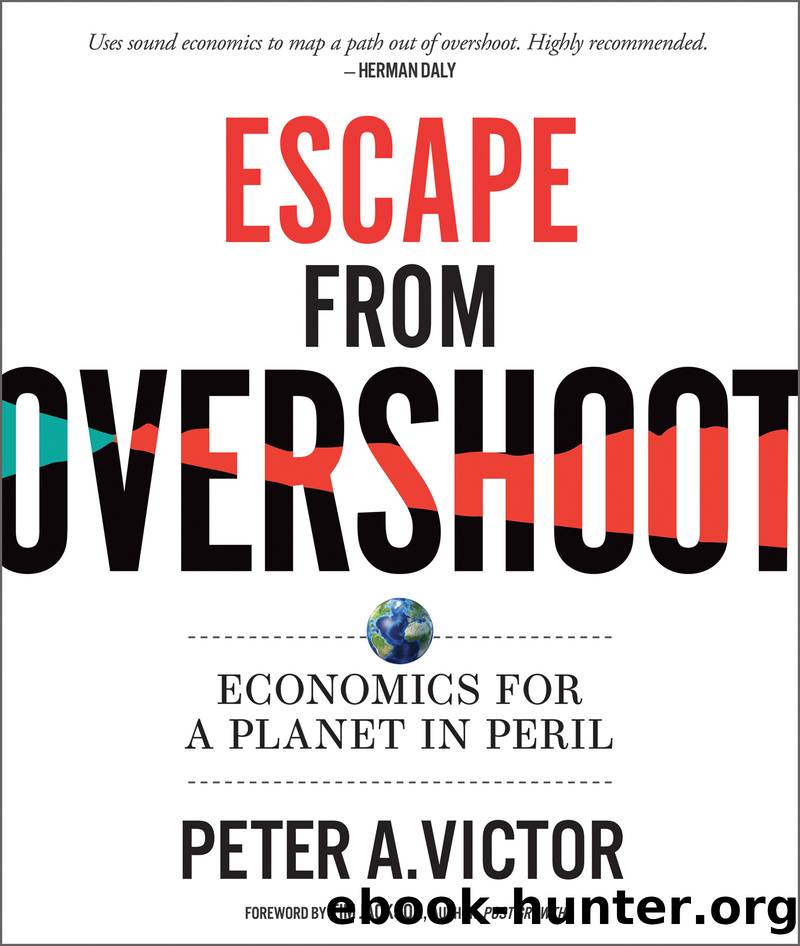Escape from Overshoot by Peter A. Victor

Author:Peter A. Victor
Language: eng
Format: epub
Publisher: New Society Publishers
The changing distribution of employment by sector has been accompanied by a gradual reduction in paid working hours. Because the data coverage for working hours is incomplete, we can only describe the trend in working hours for OECD member countries, rather than for the whole world. There has been a continuous downward trend in the annual average hours of paid work (full and part-time work combined) from 1970 to 2020 in OECD countries as a group. The substantial drop in 2020 was due to the COVID-19 pandemic, which also changed the location of work, with more people working from home. It remains to be seen whether this will be a lasting change.
When we look at selected countries, we see that the substantial differences in average work time in 1970 have narrowed, especially since 1995. Working hours changed little in the USA; they decreased the most in Japan; and in Sweden they declined then increased from a low point in 1980. In 2019 the average annual hours in paid work were 1,777 in the USA and 1,440 in the Netherlands. Norway and Denmark had the lowest hours worked in OECD countries in that year with 1,381, while Germany had 1,383. At the other end of the scale was Colombia at 2,172.
FIGURE 5.36. Occupations with highest and lowest exposure to artificial intelligence.
Credit: M. Webb, (2019), âThe Impact of Artificial Intelligence on the Labor Market,â November 6. https://ssrn.com/abstract=3482150 or http://dx.doi.org/10.2139/ssrn.3482150
Download
This site does not store any files on its server. We only index and link to content provided by other sites. Please contact the content providers to delete copyright contents if any and email us, we'll remove relevant links or contents immediately.
International Integration of the Brazilian Economy by Elias C. Grivoyannis(57476)
The Radium Girls by Kate Moore(10950)
Turbulence by E. J. Noyes(7092)
Nudge - Improving Decisions about Health, Wealth, and Happiness by Thaler Sunstein(6669)
The Black Swan by Nassim Nicholas Taleb(6239)
Pioneering Portfolio Management by David F. Swensen(5633)
Rich Dad Poor Dad by Robert T. Kiyosaki(5191)
Zero to One by Peter Thiel(4869)
Man-made Catastrophes and Risk Information Concealment by Dmitry Chernov & Didier Sornette(4788)
Secrecy World by Jake Bernstein(3811)
Millionaire: The Philanderer, Gambler, and Duelist Who Invented Modern Finance by Janet Gleeson(3599)
Skin in the Game by Nassim Nicholas Taleb(3503)
The Age of Surveillance Capitalism by Shoshana Zuboff(3451)
The Money Culture by Michael Lewis(3312)
Skin in the Game: Hidden Asymmetries in Daily Life by Nassim Nicholas Taleb(3290)
Bullshit Jobs by David Graeber(3214)
The Dhandho Investor by Mohnish Pabrai(3189)
The Wisdom of Finance by Mihir Desai(3108)
Blockchain Basics by Daniel Drescher(2915)
